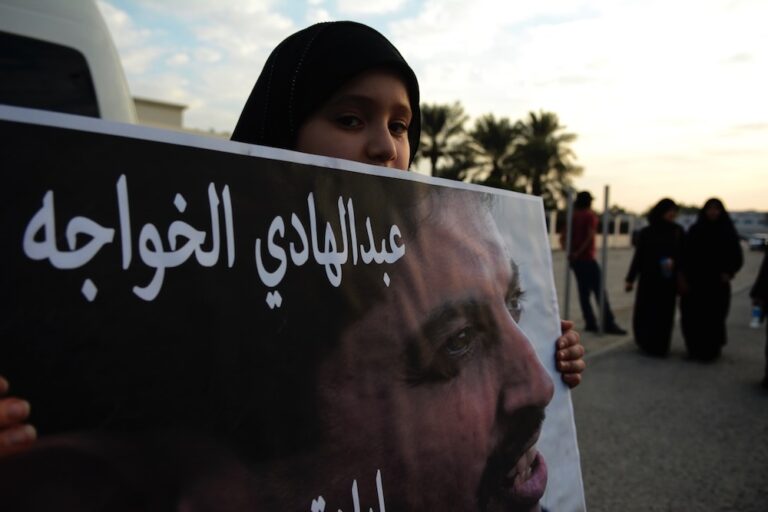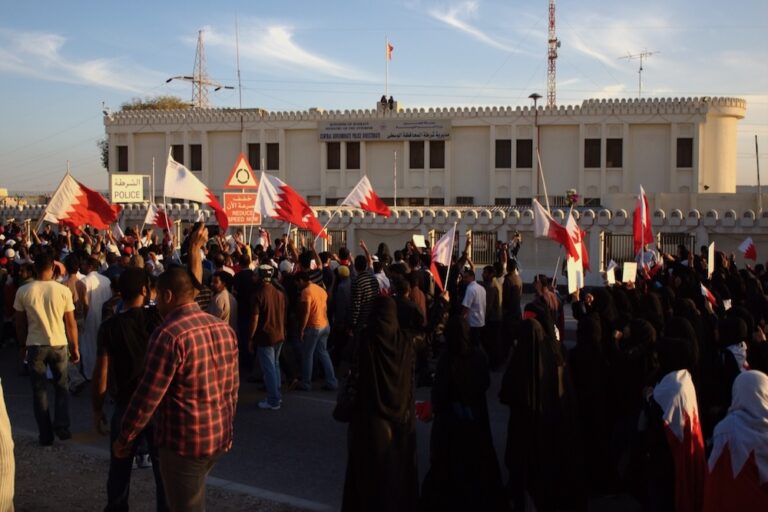(HRW/IFEX) – The following is a Human Rights Watch press release: Bahrain: Drop Charges Against Rights Defender Authorities Stifling Free Expression and Association (New York, March 11, 2009) – Bahraini officials should promptly drop the charges against the former president of the Bahrain Center for Human Rights, Abdul Hadi al-Khawaja, and lift a travel ban […]
(HRW/IFEX) – The following is a Human Rights Watch press release:
Bahrain: Drop Charges Against Rights Defender
Authorities Stifling Free Expression and Association
(New York, March 11, 2009) – Bahraini officials should promptly drop the charges against the former president of the Bahrain Center for Human Rights, Abdul Hadi al-Khawaja, and lift a travel ban against him, Human Rights Watch said today. Khawaja faces up to 10 years in prison on charges of “instigating hatred and disrespect” of the government following a speech he made on January 7, 2009.
In his speech, al-Khawaja referred to the government as an “oppressive regime” that had “plundered public lands, degraded the people, and used mercenaries against them,” and called for “removal of the ruling gang” by “peaceful means and the readiness to sacrifice oneself.” Bahrain’s public prosecutor charged him with, among other things, violating Article 160 of the Penal Code for “promoting or encouraging in any way the overthrow or change of the political system by force or any other illegitimate method.” Conviction under Article 160 carries a prison sentence of up to 10 years.
“Speaking out harshly against a country’s rulers should not be a crime,” said Joe Stork, deputy Middle East director at Human Rights Watch. “A government that claims to be promoting democracy and human rights, as Bahrain does, shouldn’t be putting people in jail for what they say and write.”
The first session of al-Khawaja’s trial, on February 8, was adjourned until March 11. The day after the first hearing, al-Khawaja was preparing to board a flight to join a human rights delegation in Iraq when he was informed that a travel ban has been issued against him until further notice.
Al-Khawaja’s remarks came in a speech at a mosque during the Shia religious holiday of Ashura. Abdulaziz Bin Mubarak Al Khalifa, assistant undersecretary for coordination and follow-up at the Ministry of Foreign Affairs, told Human Rights Watch that “Mr. al-Khawaja sought to use the occasion (of Ashura) to give religious or sectarian legitimacy to the potentially violent overthrow of the government.” He described al-Khawaja’s speech as “deliberately inflammatory language.”
The prosecution of al-Khawaja is one of a number of actions apparently being taken to stifle discussion in Bahrain, although the country’s constitution protects the right of free expression. Lamees Dhaif, a journalist for the independent Al Waqt newspaper, faces up to three years of imprisonment on Penal Code and Press Code charges related to a series of articles she wrote from February 24 to 29. The series used case studies to demonstrate the Bahraini court system’s failures in family law and criticized the judiciary for not supporting passage of a much-needed family law in Bahrain.
Another journalist, Maryam al-Sherooqi of Al-Wasat, has been charged with “insulting and degrading the Civil Service Bureau” for a column she wrote on August 27, 2008, that described discriminatory hiring practices at the bureau. The first session of her trial was held on March 3 and the trial will resume on April 8.
According to Nabeel Rajab, president of the Bahrain Center for Human Rights, internet filtering by the Ministry of Information has also been on the rise, including blocked access to websites of human rights groups and political activists.
Article 23 of Bahrain’s Constitution states that, “Freedom of opinion and scientific research is secured, everyone has the right to express his opinion verbally, in writing or otherwise, in accordance with the terms and conditions prescribed by the law.”
Article 19 of the International Covenant on Civil and Political Rights (ICCPR), to which Bahrain acceded in 2006, states that, “everyone shall have the right to freedom of expression,” and that, “this right shall include freedom to seek, receive and impart information and ideas of all kinds, regardless of frontiers, either orally, in writing or in print, in the form of art, or through any other media of his choice.”
Bahrain has previously prosecuted activists for making political statements under other elements of its Penal Code. In 2007, two activists who distributed leaflets calling for a boycott of elections faced charges in a criminal court for disseminating materials that could “harm the public interest.” The two were sentenced on those charges, but subsequently released.
“The Bahraini government portrays itself as upholding free expression and association, but is increasingly doing the opposite,” Stork said.
Human Rights Watch has previously documented threats against human rights activists in Bahrain (http://www.hrw.org/en/content/bahrain-end-threats-rights-activists).
For more of Human Rights Watch’s work on Bahrain, please visit:
http://www.hrw.org/en/middle-eastn-africa/bahrain


